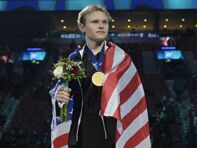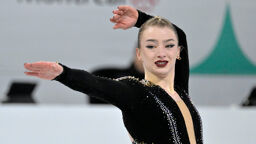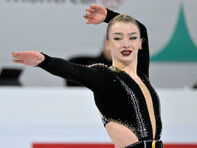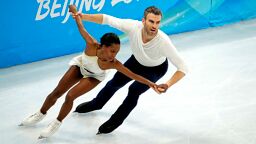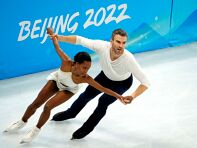Sometimes when history is made it is so obviously overdue that it overshadows itself with larger questions. An article posted on Vancouver's official Olympic Web site points out that history will be made today when French pairs skaters Yannick Bonheur and Vanessa James step on the ice to skate their short program.
The reason? Both Bonheur and James are black. It's not clear from the article, which takes a celebratory tone, whether the author intended to underscore, or was oblivious to, the obvious: that the Winter Olympics are still the "white and Asian" Games.
Sometimes when history is made it is so obviously overdue that it overshadows itself with larger questions. An article posted on Vancouver's official Olympic Web site points out that history will be made today when French pairs skaters Yannick Bonheur and Vanessa James step on the ice to skate their short program.
The reason? Both Bonheur and James are black. It’s not clear from the article, which takes a celebratory tone, whether the author intended to underscore, or was oblivious to, the obvious: that the Winter Olympics are still the “white and Asian” Games.
“It’s often been remarked that we look different on the ice. So we want to highlight that,” said Bonheur. “We want to climb the ladder to show that black skaters can stand on the podium.”
As a supposed gathering of the world, the Olympics succeeds with sports like running, soccer, and basketball-all Summer Olympic sports-which are cheap and accessible to high percentages of the world's population. By contrast, the Winter Olympics are composed entirely of niche sports in which a relatively few countries invest meaningfully in development programs for their athletes.
This, of course, is the inherent nature of the Winter Games, which have origins in wintry climates and require highly technical (and thus expensive) venues and equipment. But it is also why the Winter Olympics are less global, less competitive, and less-watched than their summer counterpart.
In 2010, Bonheur and James shouldn't be this position. Figure skating should have marked today's milestone decades ago, perhaps in Innsbruck in 1976 or Lake Placid in 1980. And the fact that it had not should remind us that Figure Skating's flaws transcend the inherent homogeneousness of the Winter Olympics.
As recent as 2002, when a scandal erupted in Salt Lake City after a French judge voted for the Russian pair over the more deserving Canadians in a vote trading scheme designed to boost the chances of the French duo entered in the Ice Dancing competition. That's just how business is done in the insular and corrupt sport of Figure Skating. And racial inequality is just another side effect of the sport's institutionalized insularity.
The Winter Olympics must find a way to globalize itself if it wants to stay relevant into the future. Dozens of diverse and developed nations have ice rinks, which don't require winter climates for training. The United States, France, Canada, Great Britain, and Australia should have invested earlier in programs that included black and Hispanic athletes.
In the meantime, I wish the best to Bonheur and James, and I hope the audience for tonight's event isn't as un-diverse as the field of competitors, so that the Olympic dream of young black kids doesn't end when they don't see anyone on the ice who looks like them. I just wish I didn't have to write this post in 2010.




